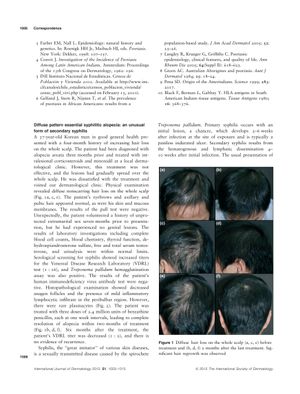Diffuse Pattern Essential Syphilitic Alopecia: An Unusual Form of Secondary Syphilis
July 2012
in “
International Journal of Dermatology
”

TLDR Syphilis can cause hair loss and should be considered in unexplained cases.
A 37-year-old Korean man presented with diffuse hair loss on his scalp, initially misdiagnosed as alopecia areata. Despite treatment with corticosteroids and minoxidil, his condition worsened. Upon further investigation, including serological tests, he was diagnosed with secondary syphilis, specifically essential syphilitic alopecia, which is a rare form of hair loss without other cutaneous symptoms. Treatment with benzathine penicillin led to complete hair regrowth within two months. This case highlighted the importance of considering syphilis in patients with unexplained hair loss and a history of at-risk sexual behavior.







